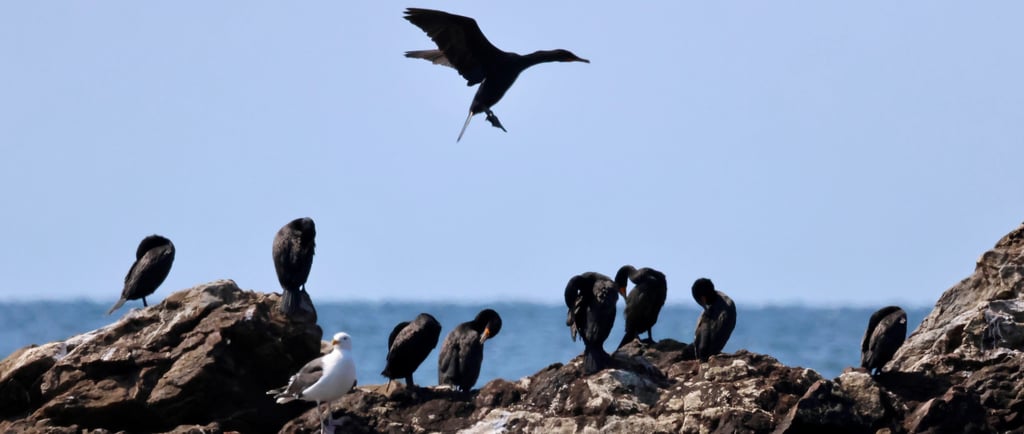24/07/2024 – Back Home 6
SuperTrip 2024 Post 56
2024 BLOG
1/22/20252 min read


We took the ferry from Woods Island to Caribou, continuing our journey eastward. We spent the short trip (about 75 minutes) on the top deck, windcheaters zipped up, scanning the sea. No whales presented themselves, but I had excellent views of gannets, cormorants and, of course, gulls.
From Caribou, we drove northeast along the coast, first on the Ceilidh Way, then on the Cabot Way, to Chéticamp, gateway to the Cape Breton National Park. It is not for nothing that most sources say “Acadia” derives from the classical “Arcadia”, the part of Greece home to Pan and Hermes, and Renaissance shorthand for “wooded paradise”, “bucolic idyll”. In July sunshine, it is completely gorgeous: the light glitters off the ocean in countless coves; deciduous and coniferous trees cover the slopes with multiple greens, silver birch trunks flashing white here and there; wet, tumbled pebbles of quartzites, jaspers, marbles, schists, shales create multicoloured beaches, chiming underfoot; igneous rocks evidence their own pooling, or are shot through with varicoloured veins; deeply blue lakes reflect that blue back up to the sky; daisies, roses, thistles, vetch offer accents (pools even) in yellows, pinks, purples.
Another etymology is that “Acadia” is a corruption of the Indigenous word “quoddy”, “a fertile area”, or the Mi’kmaq word “algatig”, or “camp”. These, too, speak to the green and plentiful feel of the terrain.
The oppression/reconciliation story here is not primarily that of Settlers against Indigenous, (although I am sure that could also be told). It is of the abuse, deportation of French-speaking settlers by English-speakers. In Fredericton, we learnt that the law requiring the provision of government services in French dates only from 1969. Before this, the marginalized French-speaking community (the poorest people in the poorest province in Canada) was effectively shut-out from government assistance. The right of French-speakers to services in their native tongue was enshrined as a right across Canada only in 1982.
But, who were the Scots who came to Nova Scotia, Cape Breton and pushed out/down the French? They were Highland crofters driven from their land during “the Clearances”, as the great landowners established sheep farming, displacing their subsistence tenants en-masse. They were persecuted Scots Catholics, fleeing the oppression following the failed Jacobite revolution. The histories of oppression, migration are nested, with wrong following on wrong. “Them” and “Us” are layered concepts. Realising just how recently “Settlers” started to accommodate even each other, makes clear how near the start we are in the work of Indigenous reconciliation.
All that said, to the summer tourist, like us, Cape Breton today is definitely “arcadian”: a sunny, peaceful place of wide bays, green mountains. It is colourful, quaint villages, filled with seas-side, seafood restaurants and naïve craft galleries, offering pottery, prints, knits, weaves that range from charming, through cute, to saccharine. But, all of which most definitely speak to a vision of place, aspired to by visitors and monetised by locals. And, when that vision is quite so lovely, what’s wrong with that?
Follow our Journey at:
Email us at:
Karen's Podcast at:
© 2025. All rights reserved.
Inspired by our 2024 Camino Francais, Karen has a periodic podcast called "I sent you a bloody boat", personal thoughts on faith by a person who believes in thinking. Also, known as "The Reluctant Christian". You can listen to it on Spotify and on Apple Podcasts at:
